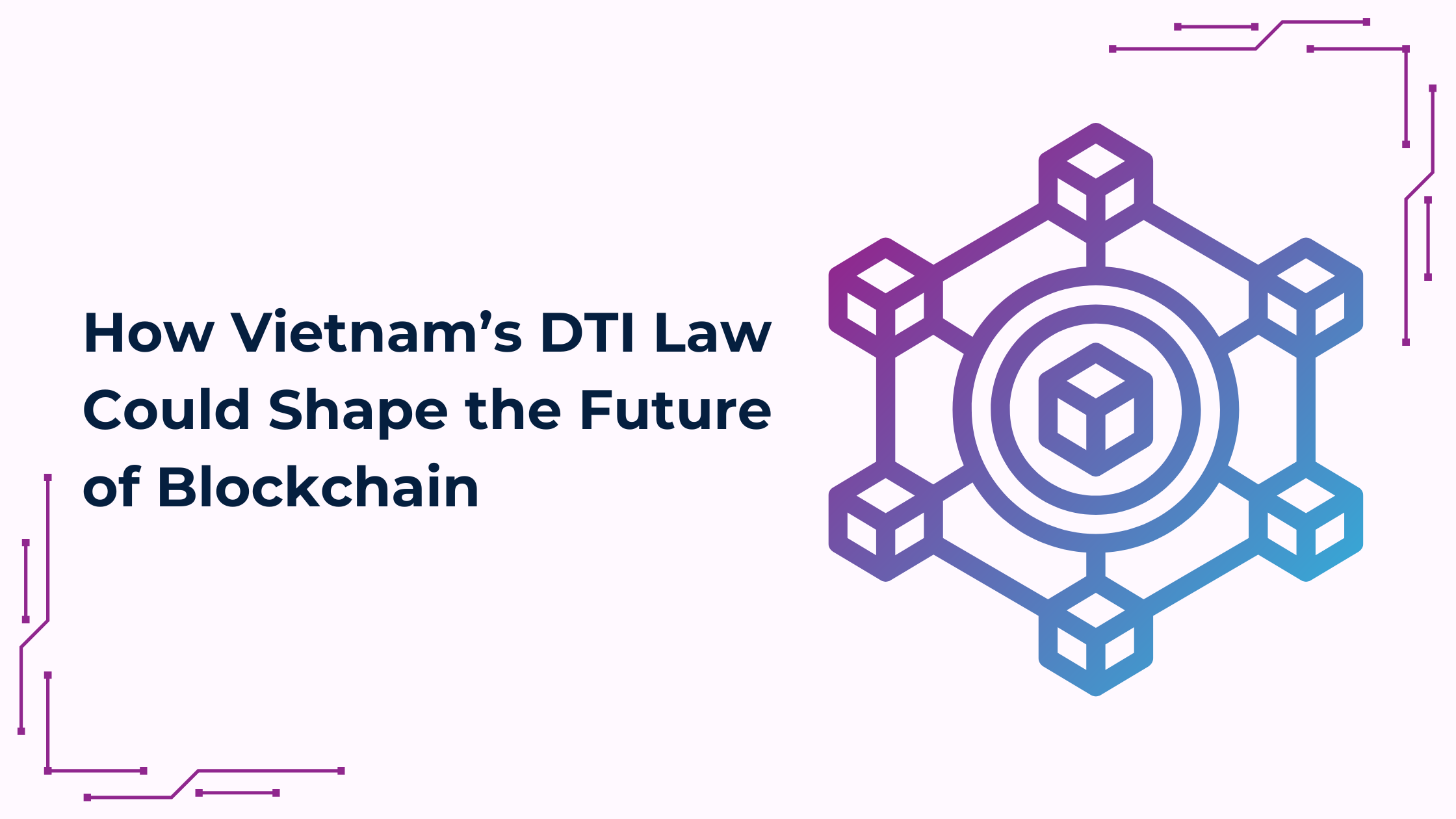How Vietnam’s DTI Law Could Shape the Future of Blockchain
 Ihuoma Anosike
Ihuoma Anosike
Vietnam is making a bold move in the digital space with its Draft Law on Digital Technology Industry (DTI). If you’re a blockchain builder in Vietnam this is something you’ll want to pay close attention to.
Right now, Vietnam is one of the most crypto-active countries in the world, but the legal landscape has been a bit chaotic. Crypto is popular, yet not legally recognized. The government has been cautious, but now, with this new law, they’re looking to set some ground rules. So, what does this mean? Could it be the start of Vietnam becoming a blockchain powerhouse? Or will it introduce roadblocks that slow down innovation?
In this article, we’ll break down what’s actually in the law, how it could affect Solana builders, and what steps you should take next.
What is the Draft Law on Digital Technology Industry (DTI) About?
Overview of Vietnam’s Draft Law on Digital Technology Industry
The DTI draft law is designed to fix the country’s legal framework in terms of rapid digital growth by setting clear policies for how digital industries should operate. The DTI draft law, comprising eight chapters and 73 articles, was deliberated by the National Assembly Standing Committee on January 6, 2025, and is expected to be finalized by May 2025.
According to the Ministry of Information and Communications, the law focuses on:
Boosting local technology innovation: Vietnam wants to move beyond just assembling tech products for foreign companies. The goal is to build homegrown digital technologies, including software, hardware, and blockchain infrastructure.
Defining digital assets and cryptocurrencies: Right now, Vietnam does not legally recognize cryptocurrencies, making it a gray area for developers and investors. This law could be a first step toward creating clearer rules for blockchain projects.
Strengthening data privacy and security regulations: The government wants stricter control over how digital businesses handle personal data, especially when it comes to cross-border data transfers.
Investing in semiconductors: Vietnam sees semiconductors as a key industry for future economic growth, which could impact blockchain hardware development and security solutions.
Minister of Information and Communications, Nguyen Manh Hung, emphasized that the law aims to create an optimal environment for nurturing digital technology enterprises, transforming the sector into a vital part of Vietnam’s economy.
While the draft law is still under discussion, it signals that Vietnam is serious about regulating and supporting digital industries. But how will this affect Solana builders and blockchain projects?
How Does This Affect Solana Builders?
1. Clarity on Crypto Regulations
For years, Vietnam has been in a regulatory gray zone when it comes to cryptocurrencies. The State Bank of Vietnam does not recognize crypto as a legal form of payment, and there is no official law governing crypto trading, taxation, or ownership. This lack of clarity has made it difficult for blockchain startups to operate with confidence.
The DTI draft law does not explicitly regulate cryptocurrencies, but it does address digital assets in a broader sense. This could be the beginning of more structured crypto regulations in Vietnam, potentially opening the door for:
Legal recognition of blockchain-based assets like NFTs and tokenized digital goods.
More transparency on crypto taxation, which would help developers and investors plan long-term.
Government-backed blockchain initiatives, encouraging startups to build on Vietnamese soil instead of relocating to more crypto-friendly countries.
However, there is also a risk of restrictive policies. If Vietnam follows in the footsteps of countries with strict crypto laws, such as China or India, Solana builders could face heavier compliance requirements, licensing hurdles, or even bans on certain types of blockchain applications.
2. Stricter Data Privacy Rules
One major focus of the DTI draft law is data security and privacy, which could impact how decentralized applications (dApps) handle user information. The government wants more control over:
How personal data is collected and stored.
Whether data can be transferred outside of Vietnam.
What security standards digital businesses must follow.
For Solana developers building dApps, this raises important questions:
Will decentralized finance (DeFi) projects need to comply with local data storage laws?
Could the government require dApps to implement KYC (Know Your Customer) measures?
Will Vietnam introduce data localization requirements, forcing projects to store user data on servers inside the country?
This could create significant barriers for blockchain builders who rely on decentralized data storage solutions, such as IPFS or Arweave. If Vietnam enforces strict data localization laws, some dApps might have to restructure how they store and manage user data, increasing costs and compliance burdens.
3. More Government Support for Blockchain
Despite the regulatory uncertainties, Vietnam is one of the most crypto-active countries in the world. It consistently ranks in the top 10 for crypto adoption, and the government has shown interest in using blockchain beyond just financial applications.
If the DTI law includes funding, tax incentives, or R&D programs for blockchain projects, it could be a huge opportunity for Solana builders. Potential benefits include:
Increased investment in blockchain research, making Vietnam a hub for Web3 innovation.
Easier access to government-backed tech incubators, which could help startups scale faster.
More partnerships between blockchain companies and traditional industries, such as logistics, finance, and e-commerce.
Vietnam has already experimented with blockchain in public services, including land registry and supply chain management. If the law actively supports blockchain R&D, it could encourage more use cases beyond DeFi and NFTs, strengthening Vietnam’s position in the global Web3 economy.
What Can Builders Do?
Stay updated on legal developments and engage with policymakers to advocate for fair regulations.
Structure projects in a way that complies with international best practices, making them easier to adapt if stricter rules emerge.
Consider working with Vietnamese legal experts to navigate regulatory risks.
Design privacy-focused solutions that align with global best practices in data security.
If handling user data, ensure that decentralized storage solutions comply with Vietnamese regulations.
Follow discussions on data localization laws to anticipate potential restrictions.
Keep an eye on government-backed blockchain initiatives for potential funding or partnership opportunities.
Explore non-financial blockchain applications, which might receive stronger government support.
Build relationships with Vietnamese institutions and enterprises to stay ahead of industry shifts.
Conclusion
Vietnam’s Draft Law on Digital Technology Industry marks a critical turning point for the country’s digital future. It signals that the government is ready to embrace blockchain, AI, and advanced tech industries, but it also brings potential regulatory and compliance challenges. For Solana builders, this law could be a double-edged sword. If the government takes a progressive approach, it could become one of Southeast Asia’s top blockchain innovation hubs, but if the law leans toward strict data and crypto regulations, it could drive blockchain startups to relocate to more Web3-friendly jurisdictions.
The best way forward? Stay informed, engage in discussions, and prepare for regulatory shifts.
Subscribe to my newsletter
Read articles from Ihuoma Anosike directly inside your inbox. Subscribe to the newsletter, and don't miss out.
Written by

Ihuoma Anosike
Ihuoma Anosike
Content/Technical Creator @WIB_Africa || Front-end developer, open-source advocate, and Web3 advocate. I love technical writing, especially writing about Web3.